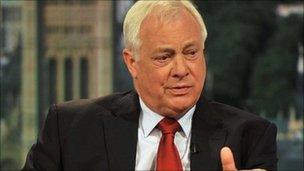Lord Patten defends the size of BBC News
- Published

Lord Patten said BBC bosses would not "be paid as much in the future"
This round-up of Friday's main media stories focuses on comments by the BBC chairman Lord Patten at the Royal Television Society convention in Cambridge and on Hardtalk.
The chairman of the BBC Trust, Lord Patten, has defended the size of the corporation's news operation and said it was popular with viewers because of its quality, reliability and accuracy, reports the Guardian, external. At the Royal Television Society's convention in Cambridge he asked: "Would Britain be better served if we weren't on the spot when Osama bin Laden was killed and had to depend on American television companies to cover it? I'm not sure that would be of benefit to the public."
The Guardian says Patten made his comments "in the wake of the revelation that the government has asked media regulator Ofcom to assess news provision, as part of a review of cross-media ownership rules". Patten said entertainment programmes were likely to be harder hit than news coverage when cuts are announced in the next few weeks.
The Financial Times says, external Lord Patten "gave his support to the expansion of the broadcaster's commercial arm, BBC Worldwide, even as rival television producers accused it of distorting markets with licence-fee funded programming". The chairman of the BBC Trust told the RTS Convention he welcomed the success of Worldwide, which sells BBC programming around the world in the form of BBC channels and one-off shows as well as merchandise. Earlier, the BBC was criticised by a rival - Tony Cohen, chief executive of Fremantle Media, maker of The X Factor and Britain's Got Talent formats. The FT reports: "Mr Cohen said BBC Worldwide sold intellectual property overseas which was paid for with licence fee money and distorted the market, raising the cost to competitors of talent and production facilities." This was denied by BBC Worldwide's chief executive John Smith.
In an interview with the BBC's Hardtalk programme, Lord Patten said future leaders of the BBC would not be paid as much as current Director General Mark Thompson, reports BBC News. Thompson earned £779,000 last year and £838,000 the year before. Lord Patten said: "If there is another director general during my time as chairman of the Trust, he or she won't be paid that" and he would "bear down" on other executive pay.
Auditors have been given free rein to investigate any part of the BBC's operation they want under the terms of a new value-for-money deal published yesterday, reports the Independent, external. It says they will be able to examine commercially sensitive information, including how much the BBC pays its top stars, after changes to the way the corporation deals with the National Audit Office (NAO) were brought in. But commercially sensitive information will not be included in any public reports. Until now, the NAO conducted inquiries at the invitation of the BBC Trust, the corporation's governing body.
Facebook's Joanna Shields says the social network "represents the biggest opportunity the television industry has ever faced - the potential to tap into a global audience that is waiting to discover, share and amplify your stories" reports the BBC's Fiona Graham. Speaking at IBC, the annual broadcasting industry gathering in Amsterdam, Ms Shields said "Social TV represents a period of renaissance for the TV industry to define new ways of engaging audiences and telling great stories."
Kweku Adoboli - the trader suspected of a £1.3bn fraud at Swiss bank UBS - appears on most of Friday's front pages, several of which say he posted a "desperate" message on Facebook in the days before his arrest. The Financial Times reports that staff at UBS are "shell-shocked" by what it says is a "catastrophic loss". There is also plenty of coverage of David Cameron's visit to Libya, as reported in the BBC's newspaper review.